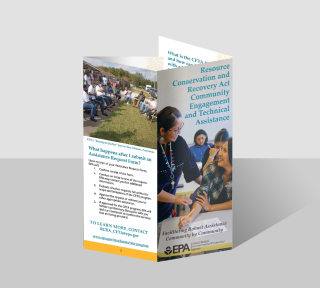RCRA Community Engagement and Technical Assistance Program
On this page:
- Overview of the CETA Program
- What RCRA is and Its Potential Impact on Your Community
- The CETA Program Can Assist with Addressing Community Concerns
- Eligible Recipients for CETA Assistance
- Types of Services CETA Can Provide to Your Community
- How Your Community Can Request Assistance
- Upon Receipt of Your Assistance Request Form
- Assistance Request Form
Overview of the CETA Program

EPA's Community Engagement and Technical Assistance Program assists communities with addressing their concerns about environmental and health issues related to waste management by providing access to support, resources, and information through a neutral third party. These services empower communities to develop informed opinions when participating in environmental decision-making about their waste-related concerns. CETA services also facilitate effective and active participation in efforts to improve public health.
What RCRA is and Its Potential Impact on Your Community
RCRA is the federal regulation that gives EPA the authority to protect human health and the environment from the potentially harmful effects of improper management and disposal of waste. More than 2.96 billion tons of solid, industrial, and hazardous waste a year are subject to the RCRA regulations. Approximately 5.3 million people live within one mile of a permitted hazardous waste facility where hazardous waste is stored, treated, or disposed of. Approximately 118 million people live within three miles of a RCRA corrective action site (roughly 36% of the U.S. population), including 37% of all children in the U.S. under the age of five.
The CETA Program Can Assist with Addressing Community Concerns
EPA’s CETA Program, through contractor support, can assist your community by supporting opportunities for community engagement and technical assistance; facilitating transparent and open communication; and providing the information and tools to make informed decisions.
Eligible Recipients for CETA Assistance
-

- Partnerships of community-based organizations.
- Faith-based organizations.
- Tribes or Tribal organizations.
- Community representatives, including local officials.
- Concerned residents.
- EPA regional offices (on behalf of communities).
- State organizations (on behalf of communities).
Types of Services CETA Can Provide to Your Community
- Assisting with coordination and support for new and established community-based organizations.
- Providing translation or interpretation services for documents and meetings.
- Supporting community engagement workshops.
- Reviewing and interpretation of RCRA decision documents.
- Reviewing and interpreting scientific data and other technical reports.
- Providing information about basic science, environmental policy, and related resources.
- Assisting communities with understanding health risks and impacts.
- Developing a social media presence to assist with creating plain language messages and amplifying community voices.
- Identifying existing studies relevant to community concerns.
- Establishing a list of interested parties and contacts based on a particular issue.
- Helping the community engage in the planning and implementation process.
- Enhancing community and interested party involvement.
- Preparing outreach materials (e.g., fact sheets, brochures, newsletters, and reports).
- Presenting educational programs on RCRA issues (e.g., safety and sustainability for individuals and families at home and in the community).
- Developing and delivering virtual presentation slides that include research and documentation on RCRA issues to support community meetings.
- Supporting community meetings by providing subject matter experts to speak on topics identified by the community or by providing meeting facilitation.
- Assisting with gathering community input to ensure all questions/concerns are identified so that community leaders can seek answers and share information.

How Your Community Can Request Assistance
Eligible entities can request assistance by completing and submitting the CETA assistance request form below.
Technical support capacity and resources are limited, so the CETA program may not be able to fulfill all assistance requests. EPA will prioritize disadvantaged and historically excluded communities.
In cases that are beyond the scope or capacity of the CETA program, EPA will attempt to redirect the request to other appropriate assistance vehicles.
Upon Receipt of Your Assistance Request Form
EPA will:
- Confirm receipt of the form.
- Conduct an initial review of the request. EPA may contact you for additional information.
- Evaluate whether requests fall within the scope and limitations of the CETA program.
- Approve the request or redirect you to other appropriate assistance.
- If approved for the CETA program, EPA will initiate a preliminary discussion with you and our contractor to confirm the services that are being provided.
Assistance Request Form
Please complete the form below and click "Submit" to apply for assistance. You must fill out the fields marked with an asterisk (*); a response is required, but you may type N/A if appropriate.
Requestor Contact Information (Organization’s point of contact):

